Rachel Reeves remains under pressure despite being handed a small bonus after data showed inflation remained unchanged in September. Inflation had been forecast to rise as high as 4 per cent by economic experts, but remained at 3.8 per cent.
Fuel prices have contributed to keeping inflation high, but good news for consumers came with food prices falling for the first time since May last year.
There will still be significant pressure on the government as it prepares to deliver its budget next month, as inflation remains far above the Bank of England’s 2 per cent target.
The Bank has needed to maintain high interest rates in a bid to combat inflation, which has contributed to higher borrowing costs for public finances, which figures yesterday showed have grown by nearly £100bn this year.
A government-set target of 2 per cent inflation is not expected to be seen until at least the latter part of 2026, though many experts have suggested higher inflation and global political instability - along with uncertainty over the UK Budget next month - means that interest rates might not be cut more than once more before the middle of next year.
Follow The Independent’s live coverage of the latest financial, stock markets and business news here:
Key points
- UK inflation holds at 3.8%
- Food prices fall for the first time in 17 months
- How September inflation impacts benefits and state pension
- Government borrowing rose to more than £20bn in September
- Pay boost for half a million workers as real living wage to rise
Where has inflation gone up and down?
15:45 , Karl MatchettThe UK’s annual inflation rate remained unchanged at 3.8% last month, as rising costs for petrol, air travel, and chocolate were balanced by easing prices in live entertainment, rail tickets, and cleaning equipment.
Here’s where prices have gone up and down recently.
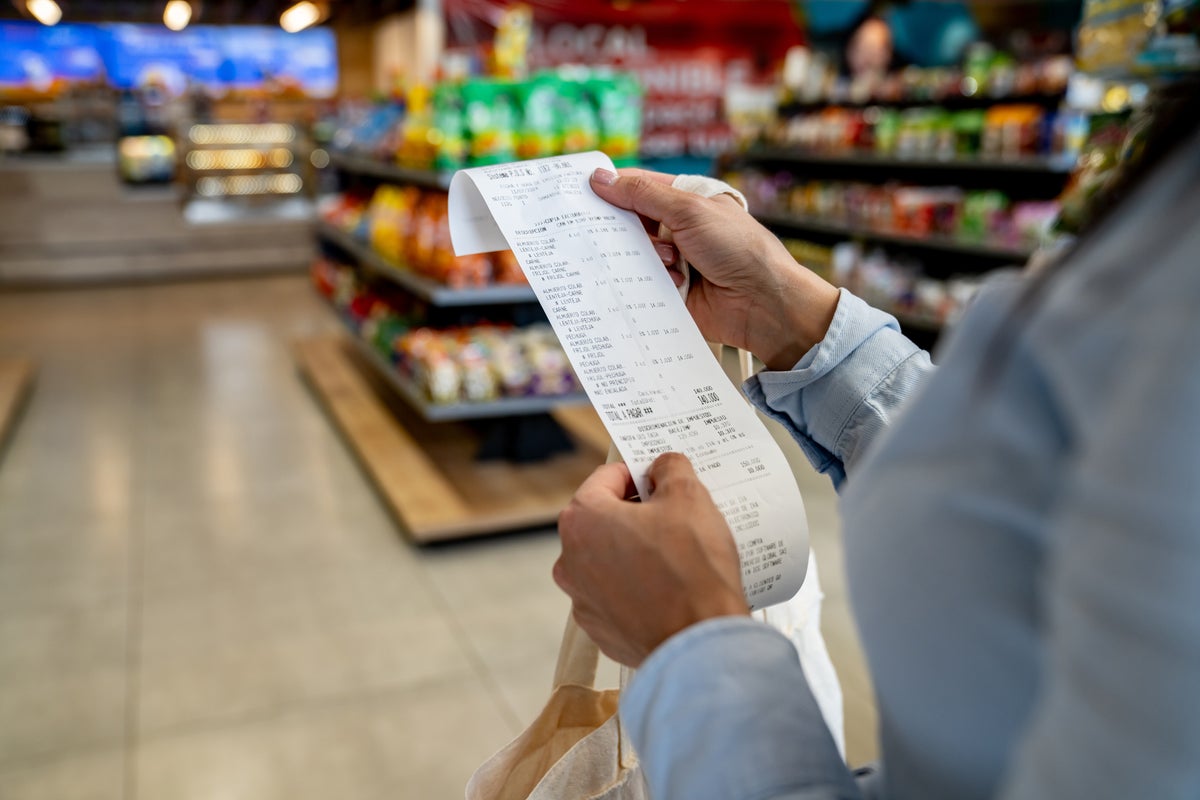
Where has inflation gone up and down? Air fares, food prices and more
Inflation news live
05:58 , Karl MatchettGood morning all. The latest UK inflation figures are set to be released at 7am - we’re expecting another nudge higher to around the 4 per cent level.
That’s predicted to be a short-term peak, but another reminder of the cost pressures families and businesses alike are facing.
Inflation expected to rise after borrowing rises again
06:10 , Karl MatchettThe first half of the year has seen the government borrow close to £100bn - and with interest rates still high it means Rachel Reeves has a lot of money to raise in the Budget next month.
Budget, debt, interest rates, inflation...it’s all linked and today we get another piece of the puzzle.
Inflation rising means it’s more likely interest rates stay higher, as the Bank of England looks to contain it.
However, higher rates also means higher borrowing costs, meaning more taxes or spending cuts are needed to plug the gaps in public finances.
That’s why Reeves wants productivity and growth up, so Treasury income also increases, and borrowing therefore can be lower. Well, part of the many reasons anyway.
Peak inflation means 'damage already done' for some families
06:20 , Karl MatchettTamsin Powell, consumer finance expert at Creditspring, said it might prove a positive for the mid-term - but still a tough situation to deal with in the here and now.
“If the Institute for Fiscal Studies’ forecast proves correct and inflation peaks in September, it will offer some hope that price rises may finally begin to ease. But for many UK households the damage has already been done. Living costs remain high, and families are still feeling the squeeze from months of rising prices across transport, food, and other essentials,” she said.
“For many families, even small increases in prices can deepen financial strain. Wages are still struggling to keep up with the cost of living, and without a savings buffer, a single bill or unexpected cost can cause real stress.
“As we move into winter, rising energy costs and Christmas spending will only add to the pressure. Many households will now be focusing on cutting back and reprioritising essentials, with day-to-day spending decisions becoming more about necessity than choice. Financial resilience is being tested, and small changes - like planning ahead, managing budgets closely, and seeking out support early - will be key to getting through the coming months.”
Britain’s borrowing is back at pandemic levels – but there are reasons to be cheerful
06:30 , Karl MatchettThe biggest gap between government spending and tax revenues in five years will come as another blow to the chancellor – but next month’s Budget is an opportunity for her to win back bond market confidence and, in turn, to lower borrowing costs, writes James Moore.
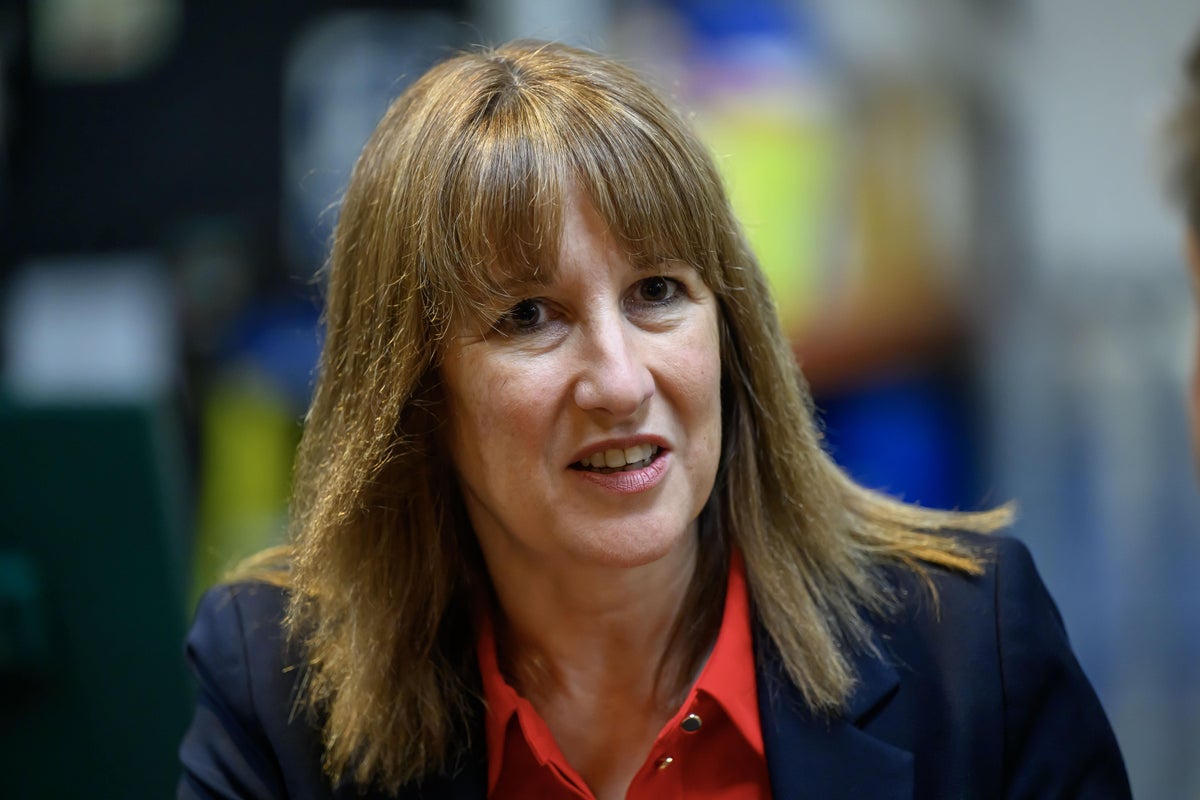
Britain’s borrowing is back at pandemic levels – but there are reasons to be cheerful
Rachel Reeves axes ‘arbitrary rules’ costing firms £6 billion ahead of Budget
06:40 , Karl MatchettRachel Reeves has said plans to scrap paperwork and “arbitrary rules” for thousands of UK businesses would save firms almost £6 billion a year by the time of the next election.
She set out a package of measures aimed at boosting lacklustre economic growth at the Regional Investment Summit in Birmingham on Tuesday.
The gathering of business leaders and investors came after more gloomy news emerged for the Chancellor as Government borrowing in September hit the highest level for the month in five years.
The data from the Office for National Statistics (ONS) piles more pressure on Ms Reeves ahead of the November 26 Budget, in which she will have to fill a black hole estimated at around £50 billion by some economists.

Rachel Reeves axes ‘arbitrary rules’ costing firms £6 billion ahead of Budget
Inflation impacting on government and families alike
06:50 , Karl MatchettInflation then, before we get the numbers.
For you, it affects the cost of your everyday bills: groceries through food inflation which has been high this year, other costs which are contracted to rise in line with inflation annually.
It’s also the indirect cause of other things you pay - like your mortgages - as when inflation is higher, so too are interest rates typically.
The government’s current struggles are similar.
“Inflation has insidiously woven its tentacles deep into the Treasury’s coffers, ratcheting up interest on the huge debt pile that’s mushroomed since 2020, inflating the cost of benefits and creating an economic backdrop where pay rises were inevitable. The chancellor will likely also have to contend with an expected downgrade to productivity forecasts from the OBR – a measure that had previously been pinpointed as a palatable solution to a decades-long problem,” said Danni Hewson, AJ Bell head of financial analysis.
“Questions remain over how to stimulate growth, make consumers feel confident enough to spend their cash and convince businesses that now is the time to take their foot off the brakes and invest. There are green shoots, with the economy resilient if uninspiring despite external factors like tariffs and geopolitical tensions, but many of the changes already implemented or under consideration are admirably long term.”
Inflation data doesn't account for essentials, says baby firm CEO
06:59 , Karl MatchettAhead of the inflation data now about to emerge, the CEO of Vital Baby says the omission of certain essentials like baby bottle feeders from the basket of items which make up the calculations makes it further from the truth than reality.
“Young families are generally among the hardest hit financially when prices go up, so to not include baby bottles and other feeding essentials in the nation’s inflation tracker seems out of touch.”
Some of those items are up far more than 4% or so, he says.
Inflation rate holds at 3.8%
07:05 , Karl MatchettThat’s a slight surprise - the inflation figure is confirmed at 3.8 per cent for September, the same level as during August.
That will be seen as a positive for the government after fears it would rise once more.
Food costs fall for first time since May 2024
07:08 , Karl MatchettCommenting on today’s inflation figures for September, ONS Chief Economist Grant Fitzner said:
“A variety of price movements meant inflation was unchanged overall in September.
“The largest upward drivers came from petrol prices and airfares, where the fall in prices eased in comparison to last year.
“These were offset by lower prices for a range of recreational and cultural purchases including live events. The cost of food and non-alcoholic drinks also fell for the first time since May last year.
“Meanwhile, the annual rise in the cost of goods leaving factories continued to increase, driven by higher food prices.”
Will Bank of England cut interest rates after inflation holds?
07:21 , Karl MatchettThe government and Bank of England need to do more to “kickstart the economy”, says Totally Money CEO Alastair Douglas.
No rise in inflation will be seen as a minor win for Rachel Reeves and co, but the two questions now are whether three straight months without going up are enough for the MPC to cut interest rates, and how that in turn might impact how much taxes must be raised by Reeves.
“While inflation has slowed considerably since the October 2022 peak, it’s still been stubbornly difficult to shake off, consistently driving up the cost of living, squeezing household finances, and piling pressure onto the lives of millions,” Douglas said.
“At the same time, the Bank of England has been slow to cut rates, making things more difficult for homeowners.
“And as if it was a co-ordinated, both the Chancellor and the Governor of the Bank of England have blamed Brexit over the past few days – just weeks ahead of the Autumn Budget, and the next Monetary Policy Committee meeting. Now they’ve found a common enemy, let’s hope they can agree on a plan to kickstart the economy.”
Transport the big outlier to keeping inflation up
07:28 , Karl MatchettThe below chart from the Office for National Statistics shows a 0.15 percentage points increase in transport costs between August and September.
That’s down to air fares and fuel, the ONS explain, along with a lesser amount toward transport maintenance costs.
Transport costs overall rose by 3.8 per cent across the 12 months to September 2025.
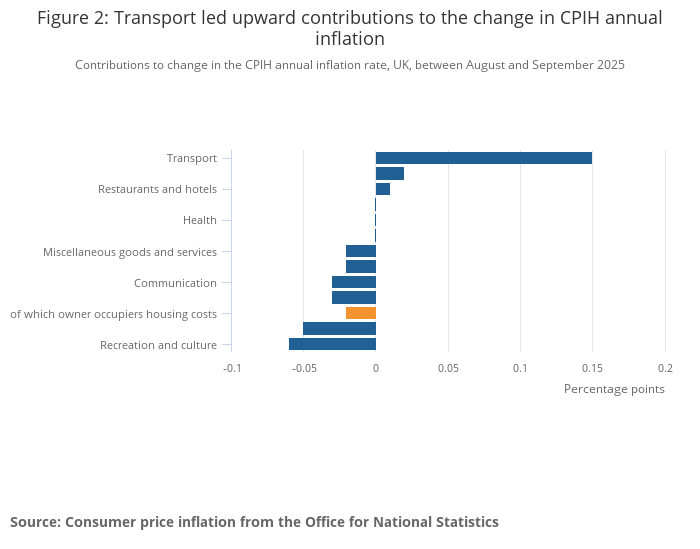
The foods which contributed to lower prices
07:36 , Karl MatchettSo, food. That’s been a big deal of late given grocery prices rising for what seems like forever.
But hopefully that’s hit a peak now - though discounting contributed to it rather than general cheaper prices.
For food and non-alcoholic beverages, the 12-month change was 4.5 per cent in September 2025, down from 5.1 per cent in August.
So still rising compared to a year ago, but not as fast anymore.
Month to month, however, those prices fell by 0.2 per cent - the first time they’ve done so since May 2024.
The ONS list the below as offering small changes to contribute to that figure:
- vegetables
- milk, cheese and eggs (particularly cheese)
- bread and cereals
- fish
- mineral waters, soft drinks, and juices
How does inflation impact benefits?
07:53 , Karl MatchettThe September inflation figure is important for more reasons than just cost of goods and services.
It’s also the month that the government uses to decide how much benefits will change by in the following April.
As such, the likes of jobseeker’s allowance, disability benefits and carer’s allowance may all now be expected to rise 3.8 per cent next year. Potential uplifts on top of that can also be applied in some cases.
Triple lock set: State pension will rise 4.8% next year
08:00 , Karl MatchettThe other factor which September’s inflation figure contributes to is the state pension.
In this case though, inflation is below wage growth, another of the three parts of the lock - the other being 2.5 per cent. Whichever is highest, that’s how much the state pension rises.
As such, next year it will go up 4.8 per cent in line with this year’s wage growth.
“A key future consideration is that the rise in the State Pension will mean those receiving the full amount will be just £22 short of the personal allowance threshold for income tax from April next year,” notes Sarah Pennells, consumer finance specialist at Royal London.
“It will therefore almost certainly rise above this in future years, meaning many pensioners already tightening their purse strings will be hit once again unless the allowance is expanded or exceptions made.”
Will Bank of England lower interest rates?
08:10 , Karl MatchettWith inflation steady and no longer rising, the question turns to interest rates and whether the Bank of England’s MPC might now vote to lower rates, particularly around the Budget.
But that shouldn’t be on the agenda, says George Brown, senior economist at Schroders.
Indeed, he feels the markets still predicting interest rate cuts could be completely wrong - and that the BoE could instead go the other direction.
“Inflation near 4 per cent should serve as a wake-up call for markets, which continue to price in two more rate cuts next year. High inflation is at risk of becoming entrenched in the UK, due to a combination of disappointing productivity and sticky wage growth. We expect the Bank of England will keep interest rates on hold until the end of 2026 and we wouldn’t rule out its next rate move being upward.
“Public borrowing figures suggest the Exchequer is experiencing the fiscal downside of this higher inflation – through increased government spending - without being equally compensated by higher revenues. Rather than simply restoring the £10 billion of fiscal headroom through a net tightening of around £25 billion, the Chancellor should consider going further. Building a bigger buffer would reduce the risk of needing to further course correct if growth and spending diverges again from the OBR’s forecast.”
Nick Saunders, CEO of Webull UK, suggested the markets might be shaken by political discourse.
“Just avoiding the psychological barrier of 4% is a release of pressure for the Chancellor. Not good news, but an escape. Looking across the channel prices in France are rising significantly slower with inflation at 1.1%, undermining claims that this is purely a global phenomenon. With the narrative of worldwide inflationary pressures losing credibility, concerns about backsliding are likely to unnerve investors, which is really is not good news for the markets.”
Where fears over higher inflation staying within economy stem from
08:14 , Karl MatchettHere’s an explanation on why the fear is that inflation “becomes entrenched” - a phrase you’ll probably hear more than once today.
Because September inflation figures are used to prop up costs later on, like the aforementioned benefits, it means we already know there’ll be an inflationary reaction to account for towards next Spring.
And that leads to concerns we keep going in a circle where higher inflation continues to appear - or being “entrenched” in our economy.
Suren Thiru, economics cirector of the Institute of Chartered Accountants for England and Wales (ICAEW), said:
“While these figures do little to suggest an easing of the financial squeeze on households and businesses, this unexpectedly restrained reading suggests that inflation has now peaked as lower food costs helped keep the headline rate unchanged.
“September’s outturn is likely to have been followed by a slight slowdown this month with the downward pressure from a smaller rise in October energy bills, compared to a year ago, likely to pull headline inflation moderately lower.
“Though it’s probable that inflation has peaked, there is a real risk that these still high price pressures become more entrenched as September's figures are used to uprate numerous key costs, including benefit payments and firms’ business rate bills.
“Despite softer than expected inflation, the chances of a November rate cut are hanging by a thread, particularly as rate-setters will likely want to analyse the inflationary impact of any measures announced in the Budget before relaxing policy again.”
Watch out for 'lifestyle creep' to help build financial security, says expert
08:20 , Karl MatchettHow do families and individuals combat the ongoing high cost pressures?
Alice Haine, personal finance expert at BestInvest urges caution in spending at a time of uncertainty.
There could yet be changes to rules around income tax and frozen thresholds - making sure you’re not seeing money head out unnecessarily is a big part of tightening the reigns.
“One of best ways to ward off the effects of high inflation is to keep spending in check. Lifestyle creep occurs when people loosen their budget as their salary increases and spend on goods and services that they once considered luxuries,” she explains.
“To avoid frittering away money unnecessarily, keep your budget the same when a salary rise comes in and use any surplus income to build up financial reserves, ensuring that money is saved and invested tax-efficiently to reduce the overall tax burden.
“For those without the luxury of an inflation-beating pay rise, reining in spending is always wise in uncertain times. Cancelling unused subscriptions, slashing non-essential spending, particularly on big-ticket items, shifting expensive debts to a 0% balance transfer credit card and building up emergency savings to cover at least three to six months of essential expenses can all help to build up financial resilience.”
Stealth inheritance tax rises lead to record £4.4bn take for Treasury
08:30 , Karl MatchettThe government pulled in £4.4bn from inheritance tax (IHT) in the past six months as more families were “quietly” pulled into the net, data from the Treasury shows.
The amount raised between April and September this year is up 2.3 per cent and is due to be a record for the government.
The boost to the Treasury coffers is in part due to frozen thresholds which have remained in place for years, meaning more and more people are being dragged into the bracket where tax is required to be paid.
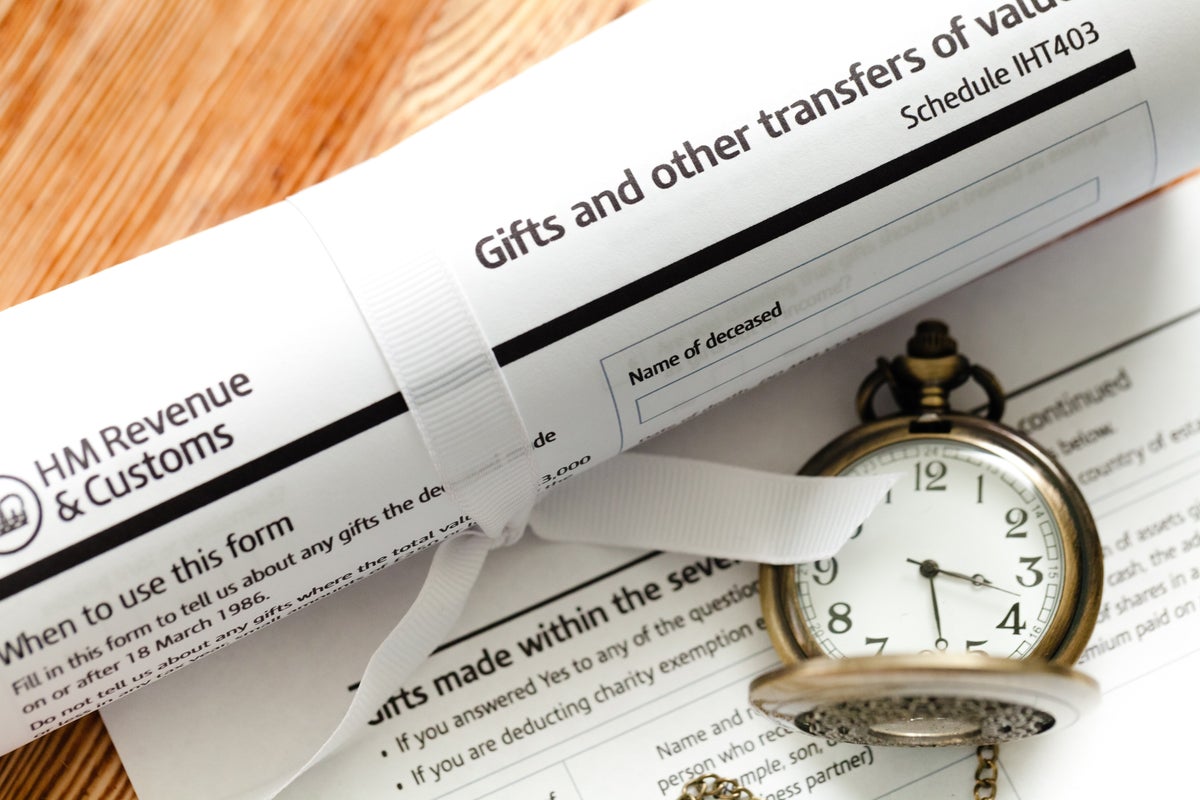
Stealth inheritance tax rises lead to record £4.4bn take for Treasury
What contributes to inflation in the UK?
08:45 , Karl MatchettThe below chart is useful to scan across the past couple of years and see how different areas have affected inflation in the UK.
On the far left, for example, the purple and pink sections show ‘restaurants and hotels’ and ‘recreation and culture’ contributing far more to inflation than they are now, on the far right side of the graph.
But dark green - ‘housing and household services’ - has been a big inflationary contributor for much of the past year and longer.
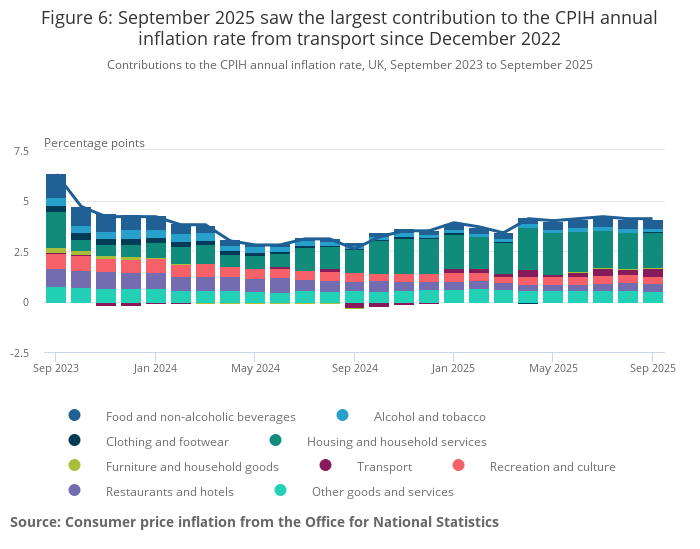
High inflation a 'uniquely British disease' compared to G7
09:20 , Karl MatchettThe UK is the outlier among G7 nations and businesses are still feeling the pinch, says the British Chambers of Commerce (BCC).
David Bharier, BCC head of research, said: “Sticky inflation has been in danger of becoming a uniquely British disease as the UK continues to stand out from the rest of the G7.
“Today’s CPI rate of 3.8%, coming in lower than expected, could provide some reassurance that we are at the peak, as expected by the BCC and Bank of England. However, the picture is mixed. Core inflation has slowed, but the reintroduced producer price data show factory gate prices rising at 3.4%, hinting that cost pressures remain in the pipeline, particularly for food and manufacturing.”
The organisation pushed for energy bills to come down and said the upcoming Budget is “pivotal”.
December rates cut possible after 'rare good news' for Reeves
09:41 , Karl MatchettThomas Pugh, chief economist at tax firm RSM UK says the good news of no inflation increase could be a double boost to Rachel Reeves.
While no new cost increases is a relief rather than a victory, if it spurs the BoE to another interest rate cut before year’s end it will be seen as steps in the right direction.
“The surprising stability of inflation staying at 3.8% in September, rather than jumping to 4% as widely expected, marks a rare bit of good news for the Chancellor ahead of a tough budget,” Mr Pugh said.
“Admittedly, inflation will probably trend down only gradually from here, so we doubt this will be enough to tempt the Bank of England into cutting interest rates next month. But it does put a December rate cut back on the cards, especially as the chancellor appears to have learnt from last year’s budget and is determined to avoid another budget-induced inflation jump in April. That means inflation should drop back to below 3% from the spring onwards.
“We still have February as the next opportunity for the Bank of England to cut interest rates, but we think the combination of easing food price inflation, a drop in oil prices and a potentially much less inflationary budget than we had thought might be coming puts a December rate cut back on the cards. This will be a rare bit of positive news for the chancellor, coming so quickly on the back of her recent comments about wanting to see interest rates come down further.”
Inflation holding high means savers MUST seek best accounts for their cash
10:00 , Karl MatchettOK, the usual reminder:
High inflation erodes the spending power of your money over time - it will weaken your financial resilience, whether you have £100 or £100k in the bank.
The way to prevent that is to ensure your money is working hard - by either investing or saving and earning a return higher than inflation.
To cut to the chase, that means any cash savings you hold need to be earning at least 4 per cent to be on the safe side right now - and that’s very much possible if you shop around quickly.
Big high street banks tend to be offering lower rates at present but a host of challenger or digital banks will give you above 4 per cent.
Yesterday, Zopa brought out a 4.75 per cent easy access account for example.
Chip offer 4.32 per cent or higher if you will only make a couple of withdrawals a year. Chase is 4.5 per cent, Cahoot is 4.4 per cent, even the Post Office is 4.1 per cent!
It’s not tough to find these so make sure you don’t leave your money earning one or two per cent just because that’s “who you’ve always banked with”.
Most of these can be opened online and in short time, but choose the one which matches your needs, not just the headline rate - you might get a bonus period, need to put a certain amount in, hold a current account or similar to get each one.
Mortgages won't come down further even if interest rates do - expert
10:20 , Karl MatchettFrom savings to mortgages - the flip side of the coin as far as interest rates go in households.
Mortgage rates have come down a fair bit this year - but if you’re considering or soon to need a new product, experts have been saying for a while that now’s the time to do it.
Don’t expect any further dramatic lowering of rates as they are already priced in - even if the Bank of England lowers its base rate, says one industry expert.
“The economy is far from out of the inflationary woods, and no-one should expect interest rates to fall any time soon,” said Peter Stimson, director of mortgages at MPowered.
“The mortgage swaps market, which tracks interest rate expectations and is used by mortgage lenders to determine the fixed interest rates they offer to borrowers, still suggests the next base rate cut is most likely to come in the New Year rather than November.
“The market expects a total of two base rate cuts in 2026, but these have already been priced into the interest rates offered by lenders. This means that even when further base rate cuts do come, they’re not likely to make much of a dent in the mortgage interest rates offered to borrowers.
“For now, no change to the inflation number will almost certainly mean no change to mortgage interest rates. After creeping down for much of 2025, for now mortgage rates have probably fallen as far as they can.”
Finance expert reveals the banks set to lower your savings rates
10:40 , Karl MatchettMore on interest rates for your money now.
Personal finance expert Kate Steere, from comparison site Finder, explained which banks or building societies are set to cut interest rates on their accounts soon.
“Inflation is lower than many expected, but it's still an extremely worrying figure for Brits who are seeing their hard-earned savings eroded in real terms. The impact of this could be softened if providers were committed to offering inflation-beating rates,” she said.
“But, instead, several well-known banks are continuing a campaign of cutting rates despite the base rate staying put. HSBC and Coventry Building Society lowered rates on several savings products on Monday, while Co-op Bank, Barclays and Virgin Money will also reduce select savings rates in the coming days and weeks.
“It’s clear that in the current climate, loyalty doesn’t pay; finding the best deal does. So, make sure you’re seeking out the best inflation-beating rates on the market, even if that means switching providers or exploring digital-only options. Digital banks like Zopa, offering 4.75%, and Chase, with its 4.5% boosted saver, are good examples of where to look.”
Pay boost for half a million workers as real living wage to rise
11:00 , Karl MatchettNearly half a million workers are set for a pay boost as the real living wage – paid voluntarily by 16,000 UK companies – rises to £13.45 an hour.
The real living wage is different to the national living wage, which is the statutory minimum in the UK. It is calculated each year based on the cost of essentials and is now paid by more than half of the companies in the FTSE 100.
The 6.7 per cent increase will come into effect in April, adding 85p an hour onto the optional payment rate. For workers in London, it will rise by 6.9 per cent, increasing by 95p to £14.80 an hour
This year's rise means a full-time worker earning the real living wage will take home £2,418 more per year than someone on the Government's minimum wage, and £5,050 more in London, said the Living Wage Foundation, which sets the rates.
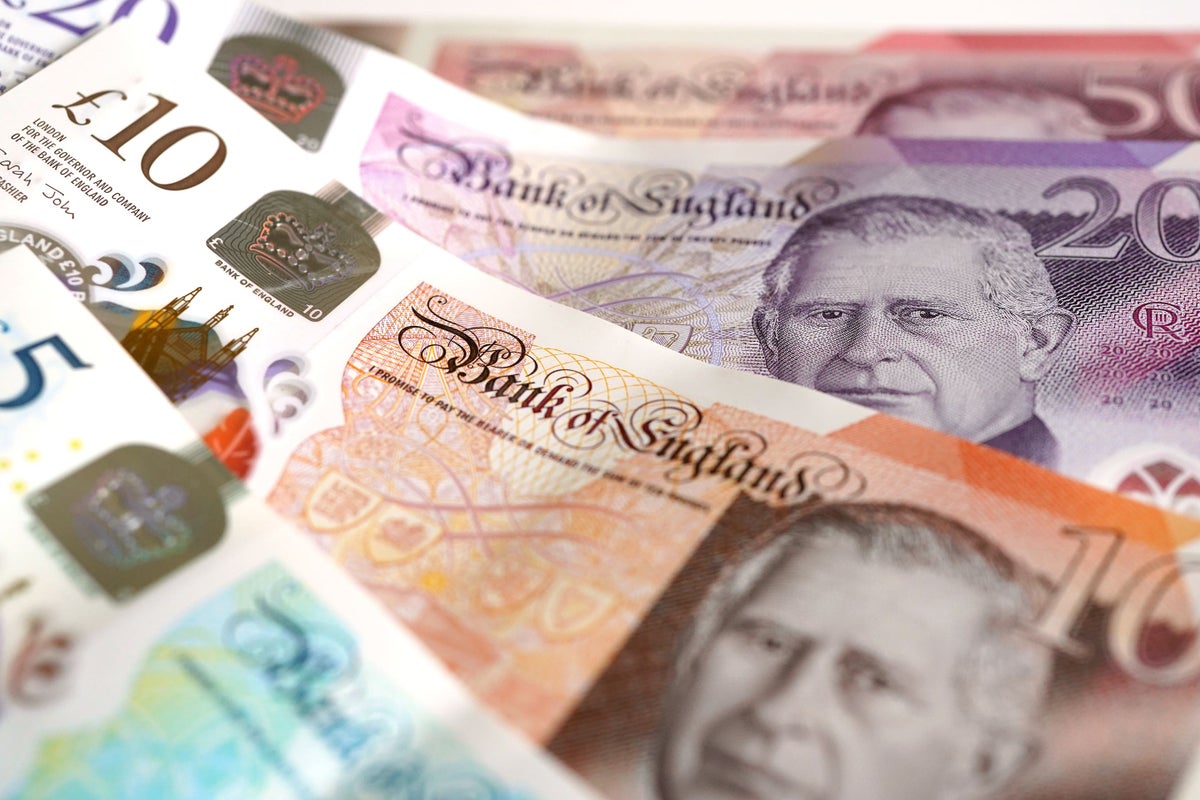
Pay boost worth up to £5,000 confirmed for half a million workers
Stats show women 40% more likely to feel financially vulnerable
11:20 , Karl MatchettHealth firm Telus have released some data with stats around finances and families.
A headline figure shows women are 40 per cent more likely, compared to men, to feel financially vulnerable.
The financial pressures on workers and uncertainty about the economy and political landscape is fuelling a cutback on spending, their research shows.
Amid this concerning trend, further stats from the Telus study say 70 per cent of workers workers have reduced spending on dining out or takeout, 55 per cent have reduced spending on clothing and personal items, 53 per cent have cut back on entertainment, 41 per cent have cut back on travel/vacation, 36 per cent have reduced spending on groceries and 25 per cent have cut back on savings or investments.
Rental sector facing biggest evolution in 30 years - expert
11:40 , Karl MatchettPrivate rental prices are on the increase again.
Propertymark CEO Nathan Emerson says a sea-change is coming in the sector and it’s vital to stay on top of the overall housing industry to ensure progression.
“With the average income needed to rent a home across the UK now reaching £45,420 and £1,514 being the typical rental price, it is clear that there are challenges which need addressing, in terms of simply not having enough supply of rental properties available to meet current demand levels.
“We are about to witness some of the biggest evolutions in over thirty years within the rental sector, with the Renters’ Rights Bill across England and the Housing (Scotland) Bill. Both will make fundamental changes to how landlords operate and are aimed at strengthening consumer rights concerning standards. Across the forthcoming decade, it is essential that all eyes are turned to encouraging long-term investment in the rental sector to keep up with increased demand and population growth.”
Jaguar Land Rover cyber attack the costliest in UK history
12:00 , Karl MatchettA cyber attack on Jaguar Land Rover (JLR) has been identified as the UK's most economically damaging hack.
The hack is estimated to have cost the country £1.9 billion.
Research from the Cyber Monitoring Centre (CMC) indicates around 5,000 businesses nationwide have been hit by the fallout.
Its experts analysed the incident's broad impact across the economy and supply chain.
Full details:
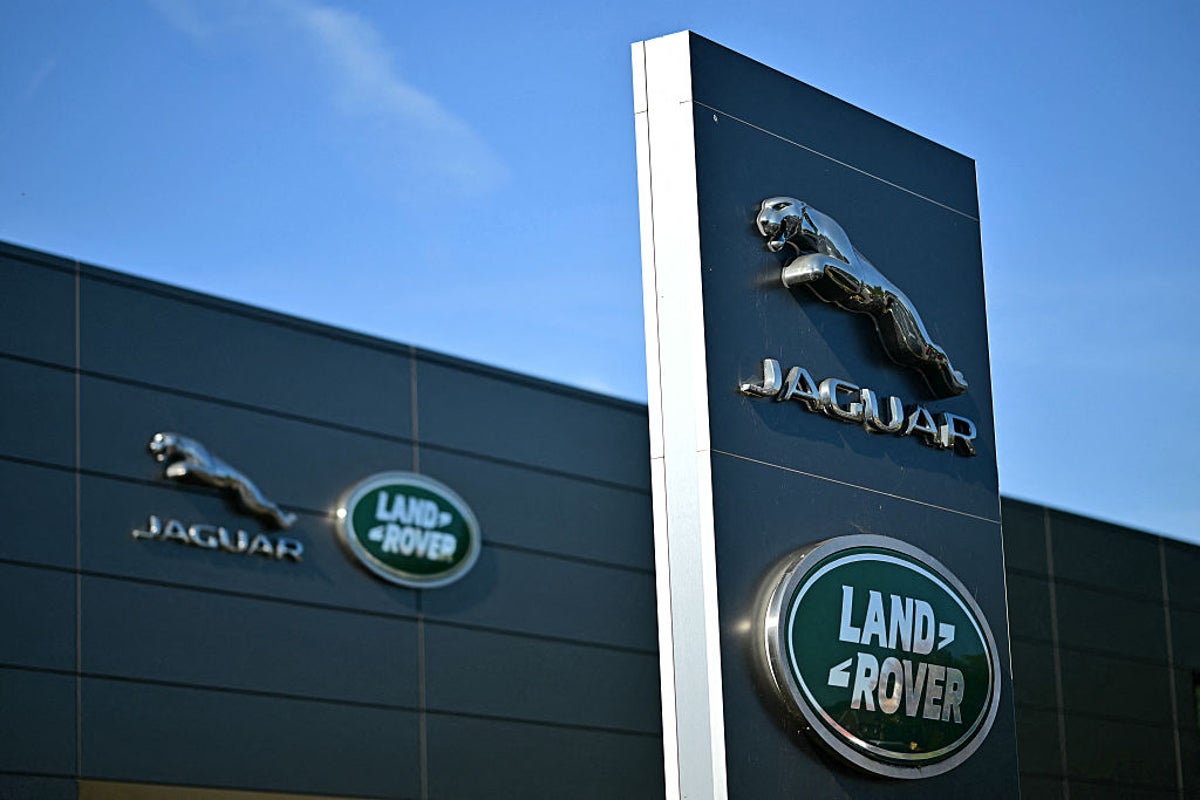
Stock markets rise after better than expected inflation figures
12:20 , Karl MatchettThe inflation data from this morning has had another knock-on effect this morning - the stock markets have risen in response.
In London markets, the FTSE 100 is up 0.84 per cent - Barclays is the leader there, up 4.5 per cent today after some good results this morning.
Some analysis from AJ Bell’s Russ Mould:
“According to consensus analysts’ forecasts, Barclays, after the strong third quarter profit of £2.1 billion, is on track to record its best ever year for pre-tax income, barring some unforeseen disaster in the fourth and final quarter, and exceed the £8.4 billion made in 2021.”
Food Foundation respond to inflation figures - weekly shop '30% higher than in 2022'
12:40 , Karl MatchettWhile food prices finally dropping month on month - the first time in 17 months that’s happened - the fact is inflation has left prices way above what they were a couple of years back.
Shona Goudie, Policy and Advocacy Manager at The Food Foundation, said, "Although the new CPI data shows food inflation is less than the previous month, food prices remain incredibly high; the cost of a weekly shop is still 30% higher than in 2022 and this is continuing to have a huge impact on the lives of people up and down the country.
“The Food Foundation's data, out today, shows that 1 in 7 households with children in the UK struggle to afford food. Of these food insecure households, 64% report cutting back on fruit and 50% cutting back on vegetables.
"Families are being forced to opt for cheap calorie dense but nutrient poor foods, which is having a hugely negative impact on the nation's health. Addressing food insecurity is essential to advancing several government priorities, including ending reliance on food banks, addressing disparities in life expectancy, breaking down barriers to opportunity, reducing child poverty, and having the healthiest generation of children ever. Failure to address barriers that prevent low-income families from accessing and affording a healthy diet will undermine these goals."
Where has inflation gone up and down? Air fares, food prices and more
13:00 , Karl MatchettThe UK’s annual inflation rate remained unchanged at 3.8% last month, as rising costs for petrol, air travel, and chocolate were balanced by easing prices in live entertainment, rail tickets, and cleaning equipment.
Air fares presented the most significant upward pressure, with the Office for National Statistics (ONS) reporting a 5.5% average increase in September compared to a year earlier. This marked a sharp reversal from August, when fares had decreased by 3.5% year-on-year.
Although petrol prices were 2.1% lower than a year ago, this represented a smaller annual drop than August’s 5.7% decline, reflecting a rise in the cost of filling up at the pumps.
Diesel prices showed a similar trend, with no change year on year in September, compared with a drop of 3.8% in August.
Full details here:

Where has inflation gone up and down? Air fares, food prices and more
Survey shows where consumers will stop spending as inflation sticks
13:20 , Karl MatchettCustomer experience experts UserTesting conducted a poll after this morning’s inflation figures, asking the UK public about their feelings on finances.
Worryingly more than half (52 per cent) said they are more concerned about their personal finances after the inflation figure was announced.
A further 36 per cent were already worried, with no change as a result of inflation sticking at 3.8 per cent in September.
46 per cent said they planned to cut back with the top areas of spending to stop including:
- dining out and takeaways (34 per cent)
- holidays or travel (22 per cent)
- clothing and personal items (15 per cent)
Additionally, seven percent of people said they can’t cut back further than they already have, as some families’ ability to deal with costs reaches breaking point.
The poll had around 1,000 respondents.
Full new state pension will be for £12,548 from April
13:40 , Karl MatchettAs a reminder, today’s inflation figure was the last part of the triple lock which could be altered.
As inflation is below wage growth, it doesn’t change anything - so a 4.8 per cent increase is expected for next year.
That means a full state pension would be worth £12,548 a year from April onwards, barring any changes from the Budget or the Department of Work and Pensions later this year.
A new report by Standard Life, involving a survey of 6,000 people over summer, found that fewer than a third (29 per cent) of people believe the triple lock will still be in place when they reach retirement.
Rachel Reeves, the Lifetime ISA is broken - please fix it
14:00 , Karl MatchettThe Lifetime ISA was meant to help young people buy their first home. Instead, it’s punishing them for trying. Gabriel Nussbaum explains why the Chancellor needs to reform it - before more first-time buyers pay the price.

High street banks found to offer worse interest rates as new 4.75% account hits market
15:00 , Karl MatchettSome of the biggest high street banks are offering lower interest rates to customers than so-called challenger banks, along with demanding more from their clients in return, a new study shows.
While the vast majority (85 per cent) of them had at least one requirement for customers to access it – such as opening a current account to get to the savings account – there was a clear skew towards more demands from high street banks, with fewer demands (and better rates) from challenger banks.
Most importantly for consumers as inflation hits the 4 per cent level, the average interest rate available with high street banks was just 2.04 per cent.
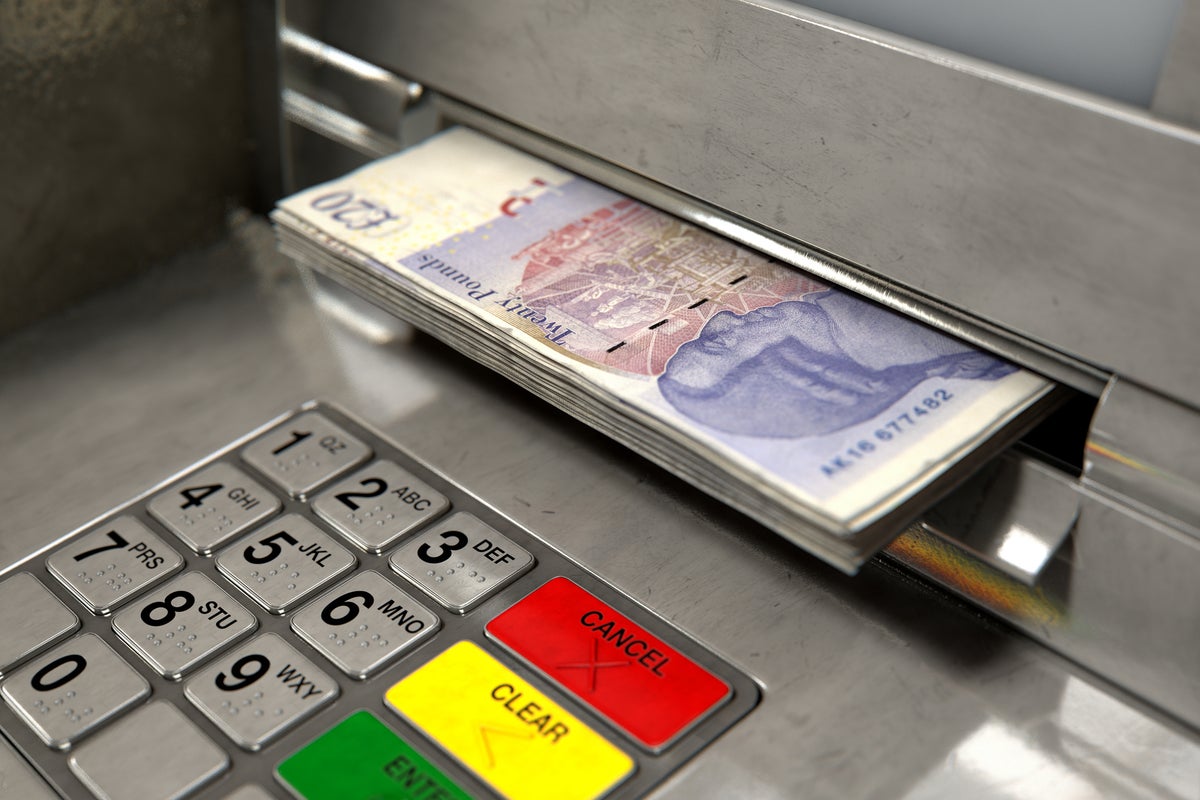
High street banks offer worse interest rates - as new 4.75% account hits market







